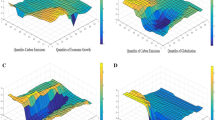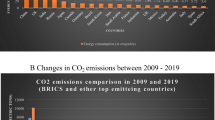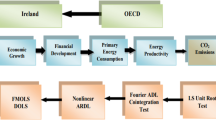Abstract
Rapid increases in energy consumption and economic growth over the past three decades are considered the driving force behind rising environmental degradation, which remain a threat to people and healthy environment. This study investigates the impact of energy consumption on environmental quality in the MINT countries using a panel PMG/ARDL modelling technique, and the Granger causality test spanning from 1971 to 2017. The empirical results confirm the existence of long-run nexus among the variables employed. The results also reveal that economic growth, energy consumption and bio-capacity have a positive and statistically significant effect on environmental degradation during the long run period. We find that a 1% increase in primary energy consumption leads to 0.4172% increase in environmental deterioration in the long-run period, but it is insignificant in the short run. This implies that energy consumption deteriorates environmental quality through a negative effect of ecological footprint. The result also suggests that as MINT countries increase the use of energy to accelerate pace of economic growth, environmental quality would deteriorate through increased ecological footprints. The coefficient of the error correction term (ect) is negative and significant (− 0.2306), suggesting that ecological footprint, a measure of environmental degradation would converge to its long-run equilibrium in the MINT region by 23.06% speed of adjustment every year due to contribution of economic growth, energy consumption, urbanization and biocapacity. The Granger non-causality test results reveal a unidirectional causal relationship from economic growth, energy consumption, and urbanization to ecological footprint and from economic growth to biocapacity. The results further show bi-directional causality between biocapacity and ecological footprint as well as between biocapacity and economic growth. Moreover, urbanization causes economic growth and biocapacity Granger-causes urbanization. Based on these findings, policy implications are adequately discussed.




Similar content being viewed by others
Data availability
The datasets generated and/or analysed during the current study are available in the repositories:
- Ecological footprint per capita was obtained from the Global Ecological Footprints Network.
- Energy consumption per capita was obtained from the World Development Indicators and BP Statistical Review.
- Gross domestic product (GDP) per capita is obtained from the World Development Indicators.
- Urbanization is obtained from the World Development Indicators.
- Bio-capacity is obtained from the World Development Indicators.
References
Akadiri SS, Alola AA, Usman O (2021). Energy mix outlook and the EKC hypothesis in BRICS countries: a perspective of economic freedom vs. economic growth, Environmental Science and Pollution Research, https://doi.org/10.1007/s11356-020-11964-w
Akram R, Chen F, Khalid F, Ye Z, Majeed MT (2020) Heterogeneous effects of energy efficiency and renewable energy on carbon emissions: evidence from developing countries. J Clean Prod 247:119122
Alam MM, Murad MW, Nomanc MAH, Ozturk I (2016) Relationships among carbon emissions, economic growth, energy cons and pop growth: testing environmental Kuznets curve hypothesis for Brazil, China, India and Indonesia. Ecol Indic 70:466–479
Ali A, Usman M, Usman O, Sarkodie SS (2021). Modelling the effects of agricultural innovation and biocapacity on carbon dioxide emissions in an agrarian-based Economy: Evidence from the Dynamic ARDL Simulations. Frontiers in Energy Research. https://doi.org/10.3389/fenrg.2020.592061
Alola AA, Yalçiner K, Alola UV, Akadiri SS (2019a) The role of renewable energy, immigration and real income in environmental sustainability target: evidence from Europe largest states. Sci Total Environ 674:307–315. https://doi.org/10.1016/j.scitotenv.2019.04.163
Alola AA, Bekun FV, Sarkodie SA (2019b) Dynamic impact of trade policy, economic growth, fertility rate, renewable and non-renewable energy consumption on ecological footprint in Europe Andrew. Sci Total Environ 685:702–709. https://doi.org/10.1016/j.scitotenv.2019.05.139
Alola AA, Akadiri SS, Usman O (2020) Domestic material consumption and greenhouse gas emissions in the EU-28 countries: implications for environmental sustainability targets. Sustain Dev 2020:1–20 http://wileyonlinelibrary.com/journal/sd
Asongu AS, Agboola MO, Alola AA, Bekun FV (2020) The criticality of growth, urbanization, electricity and fossil fuel consumption to environment sustainability in Africa. Sci Total Environ 7129:136376. https://doi.org/10.1016/j.scitotenv.2019.136376
Banday UJ, Aneja R (2019) Energy consumption, economic growth and C02 emissions: evidence from G7 countries. World Journal of Science, Technology and Sustainable Development 16(1):22–39
Bayer Y, Gavriletea MD (2019) Energy efficiency, renewable energy, economic growth: evidence from emerging market economies. Quality and Quantity: International Journal of Methodology 53(4):2221–2234
Baz K, Xu D, Ampofo GMK, Ali I, Khan I, Cheng J, Ali H (2019) Energy consumption and economic growth Nexus: new evidence from Pakistan using asymmetric analysis. Energy 189:116254. https://doi.org/10.1016/j.energy.2019.116254
Bekun FV, Alola AA, Sarkodie SA (2019) Towards a sustainable environment: Nexus between CO2 emissions, resource rent, renewable and non-renewable energy in 16-EU countries. Sci Total Environ 657:1023–1029. https://doi.org/10.1016/j.scitotenv.2018.12.104
Caglar AE, Mert M, Boluk G (2021) Testing the role of information and communication technologies and renewable energy consumption in ecological footprint quality: evidence from world top 10 pollutant footprint countries. J Clean Prod. https://doi.org/10.1016/j.jclepro.2021.126784
Castellani V, Sala S (2012) Ecological footprint and life cycle assessment in the sustainability assessment of tourism activities. Ecol Indic 16:135–147
Cellier, F. E. (2007). Ecological footprint, energy consumption, and the looming collapse. Department of Computer Science ETH Zurich CH-8092 Zurich Switzerland
Charfeddine L (2017) The impact of energy consumption and economic development on ecological footprint and CO2 emissions: evidence from a Markov switching equilibrium correction model. Energy Economics 65:355–375. https://doi.org/10.1016/j.eneco.2017.05,009
Danish H, S T, Baloch MW, Mahmood N, Zhang J (2019) Linking economic growth and ecological footprint through human capital and biocapacity. Sustain Cities Soc 47:101516
Destek MA, Sarkodie SA (2019) Investigation of environmental Kuznets curve for ecological footprint: the role of energy and financial development. Sci Total Environ 650:2483–2489
Dogan E, Taspinar A, Gokmenoglu KK (2019) Determinants of ecological footprint in MINT countries. Energy and Environment 30(6):1065–1086
Dumitrescu EI, Hurlin C (2012) Testing for Granger non-causality in heterogeneous panels. Econ Model 29(4):1450–1460
Durotoye A, Koning A, Tukker A (2019). The MINT countries as emerging economic power bloc: prospects and challenges. Developing country studies www.iiste.org ISSN 2224-607X (Paper) ISSN 2225–0565 (Online) 4(15), 99–106
European Commission (2006). The ecological footprint and biocapacity. The environment and energy, ISBN 92–79–02943-6: in Florian Schaefer, Ute Luksch, Nancy Steinbach, Julio Cabeça, Jörg Hanauer
Grossman GM, Krueger AB (1991) Environmental impacts of the north American free trade
Güngör H, Olanipekun IO, Usman O (2020) Testing the environmental Kuznets curve hypothesis: the role of energy consumption and democratic accountability. Environ Sci Pollut Res 28:1464–1478. https://doi.org/10.1007/s11356-020-10317-x
Güngör H, Abu-Goodman M, Olanipekun IO, Usman O (2021) Testing the environmental Kuznets curve with structural breaks: the role of globalization, energy use, and regulatory quality in South Africa. Environ Sci Pollut Res. https://doi.org/10.1007/s11356-020-11843-4
He X, Yao X (2017) Foreign direct investments and the environmental Kuznets curve: new evidence from Chinese provinces. Emerging Market and Finance Trade 53:12–25
Ike GN, Usman O, Sarkodie SA (2020a). Fiscal policy and CO2 emissions from heterogeneous fuel sources in Thailand: evidence from multiple structural breaks cointegration test. Sci Total Environ 702:134711
Ike GN, Usman O, Alola AA, Sarkodie SA (2020b) Environmental quality effects of income, energy prices and trade: the role of renewable energy consumption in G-7 countries. Sci Total Environ 721:137813
Ike NG, Usman O, Sarkodie SA (2020c) Testing the role of oil production in the environmental Kuznets curve of oil producing countries: new insights from method ofmoments Quantile regression. Sci Total Environ 711:135208. https://doi.org/10.1016/j.scitotenv.2019.135208
Jorgenson AK (2016) Environment, development, and ecologically unequal exchange. Sustainability 8:227. https://doi.org/10.3390/su8030227
Köksal C, Işik M, Katircioğlu S (2020). The role of shadow economies in ecological footprint Quality: Empirical Evidence from Turkey. Environmental Science and Pollution Research. https://doi.org/10.1007/s11356-020-07956-5
Liu J, Ma C, Ren Y, Zhao X (2020) Do real output and renewable energy consumption affect CO2 emissions? Evidence for selected BRICS countries. Energies, MDPI, Open Access Journal 13(4):1–8
Maddala GS, Wu S (1999). A comparative study of unit root tests with panel data and a new simple test. Oxford Bulletin of Economics and Statistics, 61(S1), 631–652, November
Mol APJ (2002) Ecological modernization and the global economy. Glob Environ Politics 2002(2):92–115
Mol APJ (2016) The environmental nation state in decline. Environment and Politics 25:48–68
Mol APJ, Spaargaren Gert (2007) Ecological modernisation theory in debate: A review. Environmental Politics 9:17–49
Nugraha AT, Osman NH (2017) The energy-economic growth Nexus in Indonesia. Journal of Business Management and Accounting 7(2):61–75
Odugbesan JA, Rjoub H (2020) Relationship among economic growth, energy consumption, CO2 emission, and urbanization: evidence from MINT countries. SAGE Open Access:1–15. https://doi.org/10.1177/2158244020914648
Onifade ST, Alola AA, Erdoğan S (2021). Environmental aspect of energy transition and urbanization in the OPEC member states. Environ Sci Pollut Res (2021). Available online https://doi.org/10.1007/s11356-020-12181-1
Ozatac N, Gokmenoglu KK, Taspinar N (2017) Testing the EKC hypothesis by considering trade openness, urbanization, and financial development: the case of Turkey. Environ Sci Pollut Res 24(20):16690–16701
Özcan KM, Özkan AU (2018). The relationship between energy efficiency and economic performance in G20 countries. Proceedings of Middle East economic association 20(1), may 2018
Paramati SR (2017) The significance of energy use for economic output and environmental protection: evidence from the next 11 developing countries. Environ Sci Pollut Res 24(15):13546–11356
Pata UK (2018) The effect of urbanization and industrialization on carbon emissions in Turkey: evidence from ARDL bounds testing procedure. Environ Sci Pollut Res 25(8):7740–7747
Pesaran MH, Shin Y, Smith RP (1999) Pooled mean group estimation of dynamic heterogeneous panels. J Am Stat Assoc 94(446):621–634
Phong LH (2019) Globalization, financial development, and environmental degradation in the presence of EKC: evidence from ASEAN-5 countries. Int J Energy Econ Policy 9(2):40–50
Rafindadi AA, Ozturk I (2015) Natural gas consumption and economic growth nexus: is the 10th Malaysian plan attainable within the limits of its resource? Renew Sust Energ Rev 49:1221–1232
Rafindadi AA, Usman O (2019) Globalization, energy use, and environmental degradation in South Africa: startling empirical evidence from the Maki-cointegration test. J Environ Manag 244:265–275. https://doi.org/10.1016/j.jenvman.2019.05.048
Rafindadi AA, Usman O (2020) Toward sustainable electricity consumption in Brazil: the role of economic growth, globalization and ecological footprint using a nonlinear ARDL approach. J Environ Plan Manag:1–25
Riti JS, Song D, Shu Y, Kamah M, Atabani AA (2018) Does renewable energy ensure environmental quality in favour of economic growth? Empirical evidence from China’s renewable development. Qual Quant 52:2007–2030
Sarkodie SA, Strezov V (2018) Empirical study of the environmental Kuznets curve and environmental sustainability curve hypothesis for Australia, China, Ghana and USA. J Clean Prod 201:98–110
Scherer L, Koning A, Tukker A (2019) BRIC and MINT countries' environmental impacts rising despite alleviative consumption patterns. Sci Total Environ 665:52–60
Sethi P, Chakrabarti D, Bhattacharjee S (2020). Globalization, financial development and economic growth: perils on the environmental sustainability of an emerging economy. Journal of Policy Modelling, (2020)
Shahbaz M (2016) Time-varying analysis of CO2 emissions, energy consumption, and economic growth nexus: statistical experience in next 11 countries. Energy Policy 98:33–48
Shahbaz M, Shahzad SJH, Alamc S, Apergis N (2018) Globalization, economic growth and energy consumption in the BRICS region: the importance of asymmetries. The Journal of International Trade and Economic Development. https://doi.org/10.1080/09638199.2018.1481991
Shao Q, Wang X, Zhou Q, Balogh L (2019) Pollution haven hypothesis revisited: a comparison of the BRICS and MINT countries based on VECM approach. J Clean Prod 227:724–738
Ssali MW, Du J, Mensah IA, Hongo DO (2019) Investigating the nexus among environmental pollution, economic growth, energy use, and foreign direct investment in 6 selected sub-Saharan African countries. Environ Sci Pollut Res 26:11245–11260
Tariq G (2018) Energy consumption and economic growth: evidence from four development countries. American Journal of Multidisciplinary Research 7(1):100–107
Twerefou DK, Danso-Mensah K, Godfred A, Bokpin GA (2017) The environmental effects of economic growth and globalization in sub-Saharan Africa: a panel general method of moments approach. International Business and Finance 42:939–949
Uddin GA, Alam K, Gow J (2019) Ecological and economic growth interdependency in the Asian economies: an empirical analysis. Environ Sci Pollut Res 26(13):13159–13172
Ulucak R, Bilgili F (2018) A reinvestigation of EKC model by ecological footprint measurement for high, middle and low-income countries. J Clean Prod 188:144–157
Usman O, Iorember PT, Olanipekun IO (2019) Revisiting the environmental Kuznets curve (EKC) hypothesis in India: the effects of energy consumption and democracy. Environ Sci Pollut Res 26(13):13390–13400
Usman O, Alola AA, Sarkodie SA (2020a) Assessment of the role of renewable energy consumption and trade policy on environmental degradation using innovation accounting: evidence from the US. Renew Energy 150:266–277
Usman O, Olanipekun IO, Iorember PT, Abu-Goodman M (2020b) Modelling environmental degradation in South Africa: the effects of energy consumption, democracy, and globalization using innovation accounting tests. Environ Sci Pollut Res 27:8334–8349
Usman O, Akadiri SS, Adeshola I (2020c) Role of renewable energy and globalization on ecological footprint in the USA: implications for environmental sustainability. Environ Sci Pollut Res:1–13
Wackernagel M, Rees WE (1996) Our ecological footprint: reducing human impact on the earth. New Society Publishers, Gabriola Island
Wang J, Dong K (2019) What drives environmental degradation? Evidence from 14 sub-Sahara. Sci Total Environ 656:165–173
Wang W, Li Q, Fang C, Zhou C (2016) The relationship between economic growth, energy consumption, and CO2 emissions: empirical evidence from China. Sci Total Environ 542:360–371
Westerlund J (2008) Panel cointegration tests of the fisher effect. J Appl Econ 23(2):193–233
World Bank (2019). “World development indicator.” https://data.worldbank.org/indicator
World Bank Group (2019). The World Bank Group Action Plan on Climate Change Adaptation and Resilience. Washington, DC: World Bank. © World Bank
World Data Atlas (2019). Indonesia economy; Mexico economy; Turkey economy https://knoema.com/atlas/Indonesia/Mexico/Turkey/Real-GDP-growthhttps:/
World Health Organization (WHO) (2018). Air pollution: air pollution infographics
Zaman K, Moemen MA (2017) Energy consumption, carbon dioxide emissions and economic development: evaluating alternative and plausible environmental hypothesis for sustainable growth. Renew Sust Energ Rev 74:1119–1130
Zhang J (2021). Environmental Kuznets curve hypothesis on CO2 emissions: evidence for China. Journal of Risk and Financial Management, 14(93). MDPI’ https://doi.org/10.3390/jrfm14030093
Funding
Not applicable.
Author information
Authors and Affiliations
Contributions
EAA: conceptualization, writing—original draft, data curation, formal analysis, investigation, methodology. NYMhdB: review and editing, writing—review and editing, supervision, validation, visualization. WASWN: writing—original draft, validation, visualization, supervision. MNNA: review and editing, writing—review and editing, supervision, validation, visualization.
Corresponding author
Ethics declarations
Ethics approval and consent to participate
Not applicable.
Consent for publication
Not applicable.
Competing interests
The authors declare no competing interests.
Additional information
Responsible Editor: Roula Inglesi-Lotz
Publisher’s note
Springer Nature remains neutral with regard to jurisdictional claims in published maps and institutional affiliations.
Rights and permissions
About this article
Cite this article
Agbede, E.A., Bani, Y., Azman-Saini, W. et al. The impact of energy consumption on environmental quality: empirical evidence from the MINT countries. Environ Sci Pollut Res 28, 54117–54136 (2021). https://doi.org/10.1007/s11356-021-14407-2
Received:
Accepted:
Published:
Issue Date:
DOI: https://doi.org/10.1007/s11356-021-14407-2




